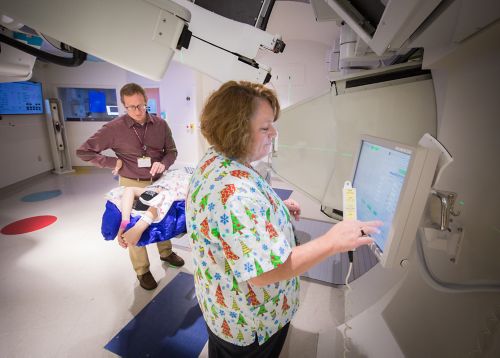If your child needs radiation therapy, they will have a team of experts who provide care throughout treatment and follow-up. This team includes doctors, therapists, nurses, and other specialists.
Team members may change depending on your child’s needs and treatment plan. Some patients may work with many specialists. Others may only see a few.
A radiation oncologist is a doctor who is specially trained to treat cancer with radiation. Before treatment starts, the radiation oncologist meets with you and your child. They review scans and help plan the treatments to make sure they are as safe and effective as possible.
After treatment, the radiation oncologist monitors progress, helps watch for side effects, and plans follow-up care.
Dosimetrist and medical physicist
The dosimetrist works with the radiation oncologist to create your child’s treatment plan. They help aim the radiation to treat the cancer while protecting healthy cells.
Physicists check the dosimetrist’s work to make sure the treatment is accurate and safe. They also check and maintain the radiation equipment, run quality control programs, and make sure everything works correctly.
You may not meet the dosimetrist or medical physicist. But both are an important part of your child’s care.
A radiation nurse is specially trained to care for patients getting radiation therapy. They help evaluate the patient before treatment starts. They talk with the patient and their family about the treatment, its possible side effects, and how to manage them.
During treatment, the radiation nurse checks how your child is feeling, watches for side effects, and provides support. After treatment, they help with follow-up care.
Before treatment begins, the radiation therapist helps with the radiation simulation. During this step, they use imaging tests to make sure your child will be in the right position for each treatment.
Each day of treatment, the radiation therapist carefully positions your child, operates the radiation machine, and gives the treatment as the doctor planned.
A child life specialist helps patients understand and get ready for radiation therapy. They explain what will happen in words that are easy to understand. They use play and activities to show what the treatment will be like. Child life specialists help reduce fear and anxiety. They give your child a chance to practice or experience parts of the treatment in a safe and supportive way.
They also support families during the process. They teach them ways to help their child cope.
Patients must be very still during radiation treatments. This can be hard for some patients, especially very young children. In some cases, patients may get anesthesia or sedation medicines to help them relax or sleep.
The anesthesia team gives the medicine, monitors your child, and makes sure they are safe.
The radiation safety team sets rules and procedures to protect everyone from unnecessary radiation exposure. They monitor radiation equipment, check that safety measures are followed, and review treatment areas. They also educate staff about safety practices and emergency procedures.
You may not meet members of the radiation safety team. But their work is an important part of keeping everyone safe.




